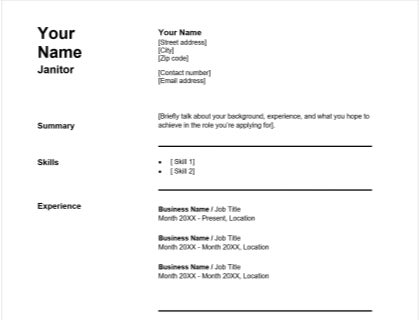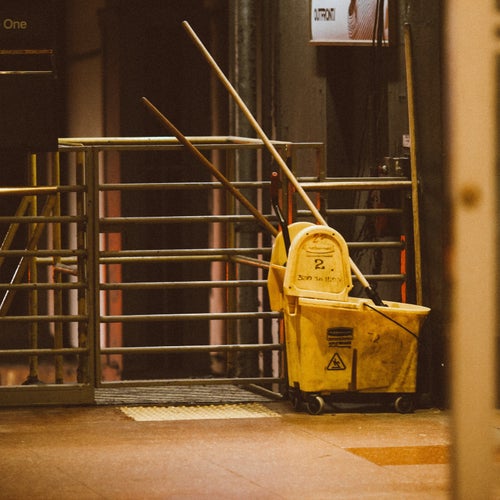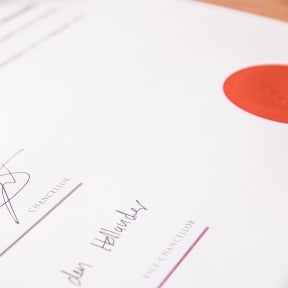
Janitor Resume — Free Template Download
Download this janitor resume template in Microsoft Word format.
Download NowJanitor Resume Example:
Your Name
Janitor
[Street address]
[City]
[Zip code]
[Contact number]
[Email address]
Summary:
[Briefly talk about your background and experience.]
Skills:
[Skill 1]
[Skill 2]
Experience:
Business Name / Job Title Month 20XX - Present, Location
Business Name / Job Title Month 20XX - Month 20XX, Location
Business Name / Job Title Month 20XX - Month 20XX, Location
Education:
School Name / Qualification Month 20XX - Month 20XX, Location
Institution / Qualification Month 20XX - Month 20XX, Location
Certificates:
Institution Name / Certificate / Month 20XX / Location
Career Achievements:
[Service award 1]
[Job promotion 1]
How to Write a Janitor Resume:

A complete guide to writing a janitor resume with a free template.
Start with a summary.
Make your summary stand out.

You'll want your summary to create a good first impression, enticing employers to continue reading your resume. Start by showcasing your most desirable qualities including your skills, years of experience, and top achievements as a janitor.
It is also important to mention your after-hours availability, since some organizations do not keep business hours and a few janitorial duties can only be performed once all other employees have left, such as locking doors and sanitizing spaces.
Keep your summary short and to the point.

Try to keep your summary under four sentences and only include the most relevant information. End with a sentence about how your specific skill set and experience will make you a suitable janitor and add value to the employers' organization.
Showcase your skills.
Start with your most impressive janitorial skills.

It's important to showcase your key skills near the top of the page to capture the employer's attention. Make a bulleted list that includes core skills such as maintaining clean in and outdoor spaces, performing minor maintenance and repair work, mixing cleaning solvents, and more.
Don't neglect to mention all relevant skills that could set you apart from other candidates, for example, disinfecting areas, performing fumigation, disposing of hazardous waste, etc.
Align your skill set with the job posting.

List all relevant skills you have acquired over time. You'll want to directly match your competencies with the job requirements.
If the job ad, for example, requires basic math skills or managing cleaning supply inventories, explicitly mention your experience in that regard. Do not list skills that will not be needed for the position.
Be honest.

When listing your skills, remain truthful and realistic about your abilities. The later stages of the hiring process typically require answering in-depth questions. It may also include practical assessments.
Add your work experience.
List your experience in reverse chronological order.

The work experience section is an important part of your resume as employers will want to learn about the tasks you've performed as a janitor in previous roles. Start this section with your most recent position. You'll want to list the jobs you've held by job title, employer, start and end dates, and location.
Include your core responsibilities.

Under each entry, briefly explain what you did in each role in bullet format. Pay special attention to your key job responsibilities. This will help employers envisage you in the role and determine the type of tasks you're skilled at.
List your qualifications.
Add your education information.

Carefully read the requirements listed in the job ad. Some employers may prefer a high school diploma or GED, while others may, for example, require in-job training combined with extensive experience.
Adding your qualifications will be advantageous, regardless of the requirements. If relevant, list your qualifications in reverse chronological order. Each entry should include an educational institution's name, as well as a start and an end date.
Mention qualifications in progress.

If you're currently studying toward a qualification, write "In progress," followed by the date you expect to complete the qualification.
Include any certificates.
List relevant certificates.

Don't neglect to mention any relevant certificates you've been issued for completing courses, practical training, or workshops, for example, in plumbing or structural fumigation.
If you obtained more than one certificate, consider which one employers would be most interested in and mention it first.
Include certificate details.

Certificates indicate to employers that you have formal training and demonstrate your commitment to your job. Be sure to mention the institutions and the dates you obtained your certificates.
Highlight your career achievements.
Mention your accomplishments.

Your career accomplishments are a great addition to your resume. You'd need to provide sufficient details, for example, being entrusted with storing keys, managing supply inventories, overseeing a cleaning team, being granted unsupervised access to restricted areas, etc.
If possible, add metrics to emphasize the impact your work had on the business. This might include that you successfully maintained the cleanliness of a corporate office block's entrance, reception area, 38 office spaces, three conference rooms, six bathrooms, a kitchen, two staff lounges, corridors, stairways, a garden, and a parking lot with no negative feedback during the last two years, etc.
Briefly describe any awards and job promotions.

To provide employers with additional insight, be sure to list instances of formal recognition that may be of particular interest to employers. These typically include service awards or job promotions.
Use bullet points to briefly describe each award and job promotion and list them in reverse chronological order. Remember that each entry should also identify the institution/employer and don't neglect to provide a date.
Similar resumes:
How to Create the Perfect Resume


